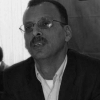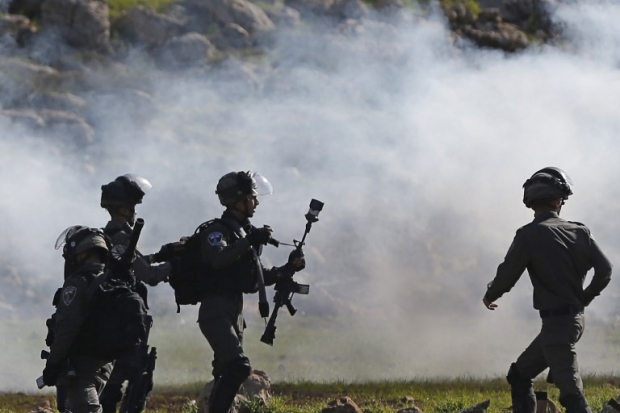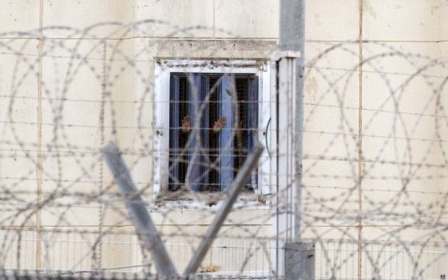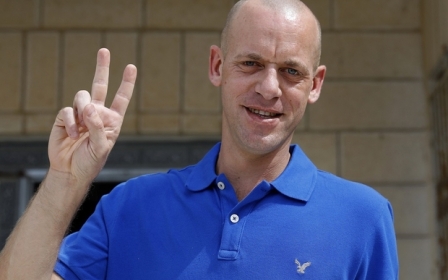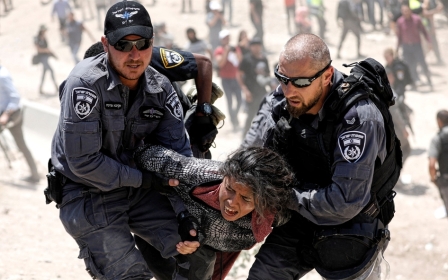Israel’s thugs beat me, but they only strengthened my dream of Palestinian freedom
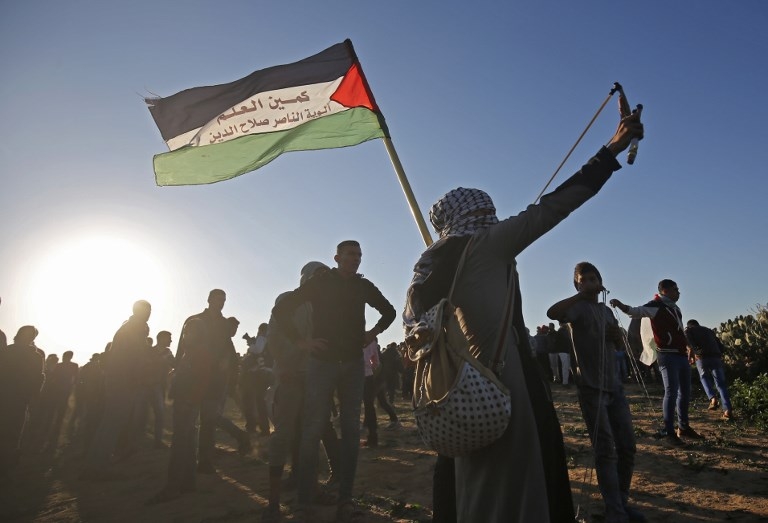
In 1983, three Israeli civilian-dressed men entered the Jerusalem-based English al-Fajr newspaper office where I was working, and asked: “Are you Awad?” I replied, “Yes, I am.”
They said they had an order from the Israeli internal security minister banning me from entering the West Bank and Gaza Strip for six months, for security reasons. They refused my suggestion to sign the order in our office, as I had done previously, and insisted that I accompany them to a local police station.
I was pushed towards a Jeep, and the three men began attacking me brutally, uttering nasty and sexist words against my mother, wife and whole family. I almost fainted, but that was not the end.
In the detention compound, they renewed their brutal physical and verbal assault until I fell to the ground, almost unconscious. It was shocking that this second round of abuse occurred after a lawyer who had been asked to accompany me to the station had left.
Fighting for liberty
This brutal episode lasted only two hours, but the impact on me - mentally, politically and intellectually - was huge and continues to this day. The sense of humiliation was immense. But later on, it only consolidated my determination and resilience to adhere to my path: the path of a colonised people fighting for freedom, liberty and a decent life.
This wasn’t the first time I was arrested, for a few hours or days, for my views and political activities - but it was the first time I encountered such barbaric behaviour from the Israeli occupation against a university graduate and former English teacher fired for his political views. The interrogators’ claim that I was a traitor to Israel for working at a Palestinian newspaper, though licensed and legal, stunned me.
The Israeli regime wants us to be disconnected from the rest of our Palestinian people ... they simply want us to be collaborators, or at least passive and docile, while we are systematically discriminated against
It made me realise their true view of Palestinian citizens of Israel. The Israeli regime wants us to be disconnected from the rest of our Palestinian people beyond the pre-1967 borders of Israel; they simply want us to be collaborators, or at least passive and docile, while we are systematically discriminated against, robbed of our land, and denied the rights to equality and to preserve our collective memory.
Since that experience, along with my brothers, wife and sons, I have experienced further arrests and physical assaults at the hands of Israel’s repressive regime. My last detention, which lasted 11 days, began on 18 September 2016. Yet, I have never been convicted in court. This has been true for many Israeli Palestinian activists, young and old, and their leaders.
International lip service
Although more people in Western countries have begun to learn about the plight of the 1.5 million Palestinians living in Israel proper, most are unwilling to acknowledge that we are part of the historical conflict, and our plight must be addressed accordingly. They still act as though Israel is a normal democracy that behaves equally towards all its citizens, regardless of ethnicity or religion, and relate only to the struggle of the illegal occupation of the West Bank and Gaza.
Regrettably, the so-called international community has merely paid lip service to opposing occupation, while endorsing the ever-hastening colonisation of the Palestinian territories. Thus, the temporariness of the Israeli occupation has turned into permanent settler-colonisation.
Israel’s true nature, and more importantly the absence of peace with the Palestinian people and the Arab world, can be understood only by looking deeply into the ideological, political and legal structure of the state of Israel, and to how this structure functions towards its non-Jewish citizens.
After the 1948 Nakba, only around 150,000 of nearly a million Palestinians survived the ethnic cleansing to remain in Israel; hundreds of thousands were made refugees. Though the number of those who remained was small, and their leaders and relatives had been forced out, the new Jewish state looked at them with suspicion. It was not acceptable to expel them too, after Israel signed on to the UN Partition Plan, so instead the leaders of the new state endorsed a tight system of control and surveillance, involving military rule, massive land confiscation, denationalisation and political repression.
Grassroots struggles
The state of Israel has taken more than 90 percent of our land, destroying traditional socioeconomic structures and turning Palestinians into cheap labourers for Jewish enterprises. At the same time, internal colonisation has been ongoing, encircling Arab towns with Jewish settlements as Arab homes are destroyed. Meanwhile, the teaching curricula imposed on Arab schools bears no mention of the history of the Palestinian people.
However, in recent decades, Palestinians in Israel have waged grassroots struggles, built political parties and become more assertive of their national identity.
Frustrated at the failure of its repressive strategy, the Israeli regime has enacted new racist laws, such as the apartheid-enshrining nation-state law, and administrative measures to curb this ever-growing political awareness. The nation-state law openly perpetuates the inferiority of Palestinian citizens of Israel, threatening their very existence.
Israel was originally born as an apartheid and colonial state, a model without which the occupation and colonisation of the rest of Palestine in 1967 wouldn’t have taken place.
No peace or justice is achievable without firstly acknowledging that Israel is a Jewish and colonial entity, and secondly endorsing the deconstruction of the apartheid Zionist regime and the construction of a truly democratic state where Arabs and Israeli Jews can live in equality.
- Awad Abdelfattah is a political writer and the former general secretary of the Balad party. He is the coordinator of the Haifa-based One Democratic State Campaign, established in late 2017.
The views expressed in this article belong to the author and do not necessarily reflect the editorial policy of Middle East Eye.
Photo: A Palestinian protester carrying a national flag uses a slingshot to hurl stones during demonstrations in southern Gaza on 14 December (AFP)
New MEE newsletter: Jerusalem Dispatch
Sign up to get the latest insights and analysis on Israel-Palestine, alongside Turkey Unpacked and other MEE newsletters
Middle East Eye delivers independent and unrivalled coverage and analysis of the Middle East, North Africa and beyond. To learn more about republishing this content and the associated fees, please fill out this form. More about MEE can be found here.


